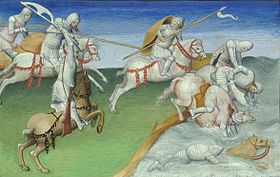Berke–Hulagu war
| Berke–Hulagu war | |||||||
|---|---|---|---|---|---|---|---|
| Part of the Division of the Mongol Empire and the Golden Horde–Ilkhanate war | |||||||
 Battle at the Terek (1262). Hayton of Corycus, Fleur des histoires d'orient. |
|||||||
|
|||||||
| Belligerents | |||||||
| Ilkhanate |
|
||||||
| Commanders and leaders | |||||||
|
Hulagu Khan, Abaqa Khan |
|
||||||
The Berke–Hulagu war was fought between two Mongol leaders, Berke Khan of the Golden Horde and Hulagu Khan of the Ilkhanate. It was fought mostly in the Caucasus mountains area in the 1260s after the destruction of Baghdad in 1258. The war overlaps with the Toluid Civil War in the Mongol Empire between two members of the Tolui family line, Kublai Khan and Ariq Böke, who both claimed the title of Great Khan (Khagan). Kublai allied with Hulagu, while Ariq Böke sided with Berke. Hulagu headed to Mongolia for the election of a new Khagan to succeed Möngke Khan, but the loss of the Battle of Ain Jalut to the Mamluks forced him to withdraw back to the Middle East. The Mamluk victory emboldened Berke to invade the Ilkhanate. The Berke–Hulagu war and the Toluid Civil War as well as the subsequent Kaidu–Kublai war marked a key moment in the fragmentation of the Mongol empire after the death of Möngke, the fourth Great Khan of the Mongol Empire.
In 1252, Berke converted to Islam, and in 1257 he assumed power in the Golden Horde after the death of Ulaghchi. Like his brother Batu, he was loyal to the Great Khan Möngke. Although aware of Berke's conversion to Islam, Hulagu, after conquering Persia, destroyed Baghdad in 1258, added Iraq to the Mongol Empire, advanced towards Syria and Mamluk Sultanate, and began a war of attrition against the Mamluk Sultanate. Berke became enraged with Hulagu's rampage through Muslim lands, and as a preparatory step, directed his nephew Nogai Khan to raid Poland in 1259 in order to collect booty to finance a war. Several Polish cities were plundered, including Kraków and Sandomierz. Berke then struck an alliance with the Mamluk Sultan Qutuz and later Sultan Baibars of Egypt.
...
Wikipedia
